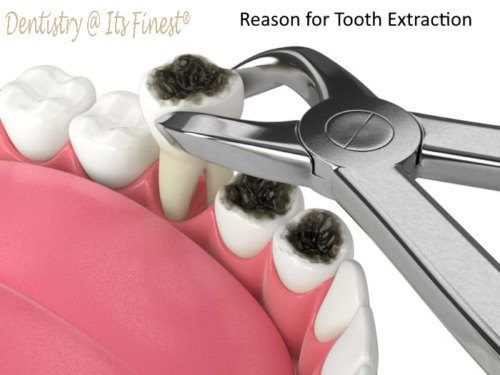Dental professionals would only want your teeth removed only when necessary. They would do their best to treat the underlying condition first such as getting rid of cavities, performing root canals, or any other treatment that won’t resort to extraction. Therefore, if they suggested removing it, you know that you’re in for a difficult situation.
A tooth may need to be extracted for the following situations:
An important step you can do to avoid extractions is to brush and floss your teeth regularly and visit your dental expert twice a year.
Before Dental Professionals Turn to Extractions
Tooth decay occurs due to several reasons. Maybe you are not taking food care of your teeth. Maybe your enamel is so weak that it can decay easily. You may never know that cause unless you have it checked by your dental professional. It is important to correct the decay before it resorts to extraction.
During dental exams, your specialist will use probing tools and x-ray to check for signs of cavities. A more modern tool such as a laser cavity detection machine can make the process easier by using light waves to reflect the light of the tooth. When there are cavities these will show up as spots in the teeth.
When the patient has a plaque, it combines with bacteria to form an acidic substance. The acid will erode the outer enamel layer until it gets deep into the dental pulp where the decay will spread and cause infection. You don’t want the decay to reach the pulp, that is why proper maintenance of your teeth is very important.
If severe decay is found, dental experts who try to treat it first with root canal treatment. This usually occurs when the decay has already reached the pulp which contains blood vessels and nerve endings. You’ll know if the decay is severe since you’ll have a very painful toothache that you’ll need to visit your dental expert. A root canal treatment treats the one that has caused severe pain, abscess, swelling, inflammation, or bone loss. It is also used to treat infections surrounding the gums. Root canal treatment is a lengthy procedure as the dental professional does whatever they can to not resort to extraction. Learn more about how long it takes for the hole to close after tooth extraction, the factors affecting healing time, and essential post-extraction care measures for a smoother recovery.
Why Extractions are Necessary
When all other options have been considered and the condition is too severe, this is when your dental professional will resort to extraction. Tooth extraction is needed when it is causing severe damage to the neighboring teeth and gums. Don’t worry about how much it will cost as this treatment are normally affordable. A dental extraction may be necessary if you experience the following problems:
If you are experiencing tooth pain or other symptoms, it is essential to contact your dental professional right away.
What else you should learn about tooth extractions besides why it is Necessary?
Extracting a tooth involves more than necessity. Consider aftercare, potential complications, types (simple vs. surgical), and alternatives for dental health. Learn how much tooth extraction costs, procedures, recovery details, potential complications, alternatives, implications for replacing lost tooth, costs, and preventive care for remaining teeth.
Call Dr. Michael Ayzin at Dentistry At Its Finest to schedule an appointment.

